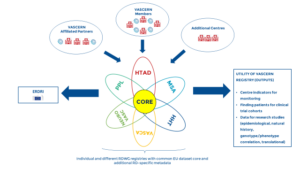Registry

Registries are necessary in all types of research and for epidemiological surveillance. As rare diseases are rare and patient numbers are therefore often limited, sharing of data is absolutely crucial.
The sharing will be facilitated by the FAIR principles: The FAIR data principles are a set of principles used to make data findable, accessible, interoperable and reusable (FAIR). They also provide the guidelines for good scientific data management and stewardship in order to maximize the use of valuable research data by the scientific community.
In order to make data FAIR, the first step is to make data findable, by assigning a globally unique and persistent identifier to data/metadata. Next, one must describe data/metadata using ontologies and vocabularies and generating machine-readable data. A semantic model, that describes the relations between the concepts, can be made in order to create this machine-readable data. The accessibility of the data must be also well defined. Metadata can be made available on a FAIR Data Point, making it findable online. Finally, data must be reusable, meaning that it can be reproduced and reused, so it must be richly described and provide clear usage licenses and accurate information on its provenance.
Learn more about the FAIR registry in this educational video.
The registry is organised as a core, common to all the subregistries, including the commun data elements chosen by the EU, and subregsitries specific for a group of diseases, corresponding to the RDWGs (HHT, HTAD, MSA, Neurovasc, PPL, VASCA)
The Registry Working Group is chaired by Prof. Leo Schultze Kool from the Radboud university medical center in Nijmegen, The Netherlands. Prof. Guillaume Jondeau is Co-chair. Each sub-registry has a responsible person (see specific page).
Work Package on Patient Registries
Several RDWG specific registry projects are ongoing (see pages specific for the RDWGs), including the pilot project: VASCERN VASCA FAIR Registry which is underway. The plan for VASCERN is to start with local registries where the structure (minimal dataset) and program used for each database is FAIR compatible and can be extended upon later. The metadata model has now been implemented on a server where 8 VASCA expert centers will have a registry on that server. The secure server is located in Amsterdam. Once the registry has been tested by the VASCA expert centers, it may be extended to include other RDWGs of VASCERN.
The VASCERN Registry Technical Team meets every 3 weeks in order to discuss the technical aspects of the individual RDWG registry databases, their FAIRification, and their evolution.
